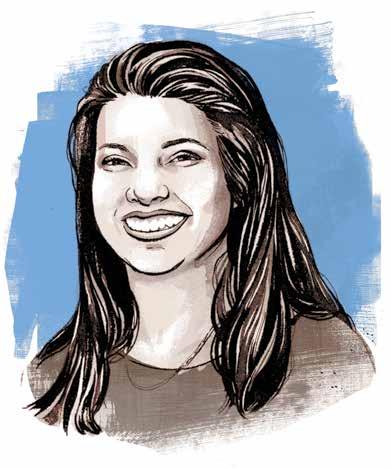
4 minute read
Experiential
Extra Credit
Celebrating accomplishments from SLCC faculty
DR. MAURA HAHNENBERGER
Geosciences associate professor Hahnenberger co-authored “Plastic rain in protected areas of the United States” with Janice Brahney, Margaret Hallerud, Eric Heim and Suja Sukumaran, published in Science magazine in June 2020. She also co-authored “‘Dust in the wind’ from source-to-sink: Analysis of the 14–15 April 2015 storm in Utah,” with Kathleen Nicoll and Harland L. Goldstein, published in Aeolian Research in October 2020. The first paper focuses on microplastics unexpectedly found in the air in national parks and other federally protected areas across the western U.S. The second describes the lifecycle of a dust storm caused by a strong intermountain cyclone.
DR. WESLEY SANDERS
Engineering associate professor
GLEN JOHNSON
microscopy specialist
As part of a national nanotech consortium, Sanders and Johnson are facilitating SLCC’s participation in a $1.65 million National Science Foundation grant to Pennsylvania State University. SLCC’s portion is $60,000 for 2020 through 2023. The funds will be used to upgrade existing microscopy and nanotechnology coursework at SLCC. The college offers a certificate of proficiency in nanotechnology, an important component of numerous fields, including semiconductors, materials science, metallurgy, engineering, environmental studies, medicine, manufacturing and others.
CHRISTOPHER JOHNSON
Geology assistant professor
The 2020-2021 year is the final of a four-year, $350,000 National Science Foundation grant administered at SLCC by Johnson. Its goal is to increase the number of students majoring in geology at the college. The program pays eight geology majors annually to conduct original research projects, ranging from field sampling of soil and water, to lab analysis, to mapping with ArcGIS, a suite of geographical information system software. Nearly a dozen students in the program so far have presented their research at national and local geologic conferences.
DR. DAVID HUBERT
Associate Provost for Learning Advancement
Hubert wrote “Attenuated Democracy: A Critical Introduction to U.S. Government and Politics.” It was published digitally in 2020 through OPEN SLCC, the college’s free online resources portal, available to anyone. For more information, visit slcc.pressbooks.pub.
DR. ANTHONY NOCELLA
Criminal Justice assistant professor
Nocella co-edited with Mark Seis, and Jeff Shantz “Classic Writings in Anarchist Criminology: A Historical Dismantling of Punishment and Domination.” AK Press published the collection of critical writings in May 2020.
He also co-edited with Seis and Erik Juergensmeyer “Neoliberalism and Academic Repression: The Fall of Academic Freedom in the Era of Trump.” Originally published by Brill Books in 2019, the collection was reissued by Haymarket Books in 2020.
DR. WIJITHA BANDARA
Religious Studies assistant professor
Bandara’s work is the first English translation of the Buddhist text “Sangharaja Sadhucariyava.” Titled “Sangharaja Sadhucariya: A Biography of Velivita Saranamkara Sangharaja,” his translation describes how the monk Saranamkara re-established Buddhist education in Sri Lanka in the 1700s by restoring Theravada Buddhism to the island nation. The work was published by Samayawardhana Bookshop Ltd. Colombo in June 2020.
DR. POOK CARSON
Business Management professor
Carson, with James P. Gander, co-authored “Does Unemployment Affect Presidential Elections? It Depends Where You Look,” published in the Journal of the Utah Academy of Sciences, Arts, and Letters in 2020. The paper examines the relationship between unemployment rates and U.S. presidential election outcomes from 2000-2016.
DR. AMAR SAHAY
Business Managment professor
Business Expert Press published Sahay’s “Business Analytics: A Data-Driven Decision Making Approach for Business, Volume I” in August 2018 and followed up with volume II in November 2019. The books explore factual, data-based models to measure business performance and guide organizations in visualizing and predicting future performance.
experiential
Learning to think
School of Science Math & Engineering
NAME: Dahlia “Dr. S” Salloum WHAT SHE TEACHES: College Biology, Human Anatomy, Human Physiology NUMBER OF YEARS TEACHING AT SLCC: Two UNDERGRADUATE: Rutgers-Newark DOCTORATE: New Jersey Institute of Technology (NJIT) & Rutgers- Newark (RU-N) Federated department of Biological Sciences
WHY WORKING AT SLCC MATTERS:
We focus on preparing students from diverse backgrounds for their future careers as university students or workforce professionals. I truly feel that students who attend SLCC or any other community college are afforded an opportunity to learn ‘how to college.’ Our student body is why working at SLCC matters. We get to interact with students who may otherwise get lost in a large university setting. Working at SLCC has been the most inspiring place I’ve worked. So many of our faculty members have been such positive influences on me, and it is refreshing to see that we are all here for the same reason.

GREATEST PROFESSIONAL CHALLENGE:
Accepting the fact that perfecting my pedagogy is a practice and not a goal. I worry about how effective my teaching practices are and how students will respond to my teaching style. So far, I have received positive feedback from students. I realize that after teaching a particular course for several years, there is a certain wisdom that comes with experience. I have yet to have this opportunity since beginning my teaching career.

GREATEST PROFESSIONAL ACCOMPLISHMENT:
Receiving emails from former students stating that they’ve accomplished their goals and have been accepted into nursing, dental and medical programs. Hearing from former students about something they learned in my class that really stuck with them.
ADVICE FOR STUDENTS OR OTHERS:
Do not let your grades define you! Do not let that one low score on an exam, assignment or project take over your personal narrative. It is easy to listen to that little voice inside you constantly doubting your abilities. Everyone fails. We tend to see failure as something negative when, in fact, it is part of the road to success. Enjoy the journey of learning and realize that everyone fails. Realize that you can achieve all your goals with perseverance and persistence.






